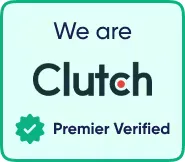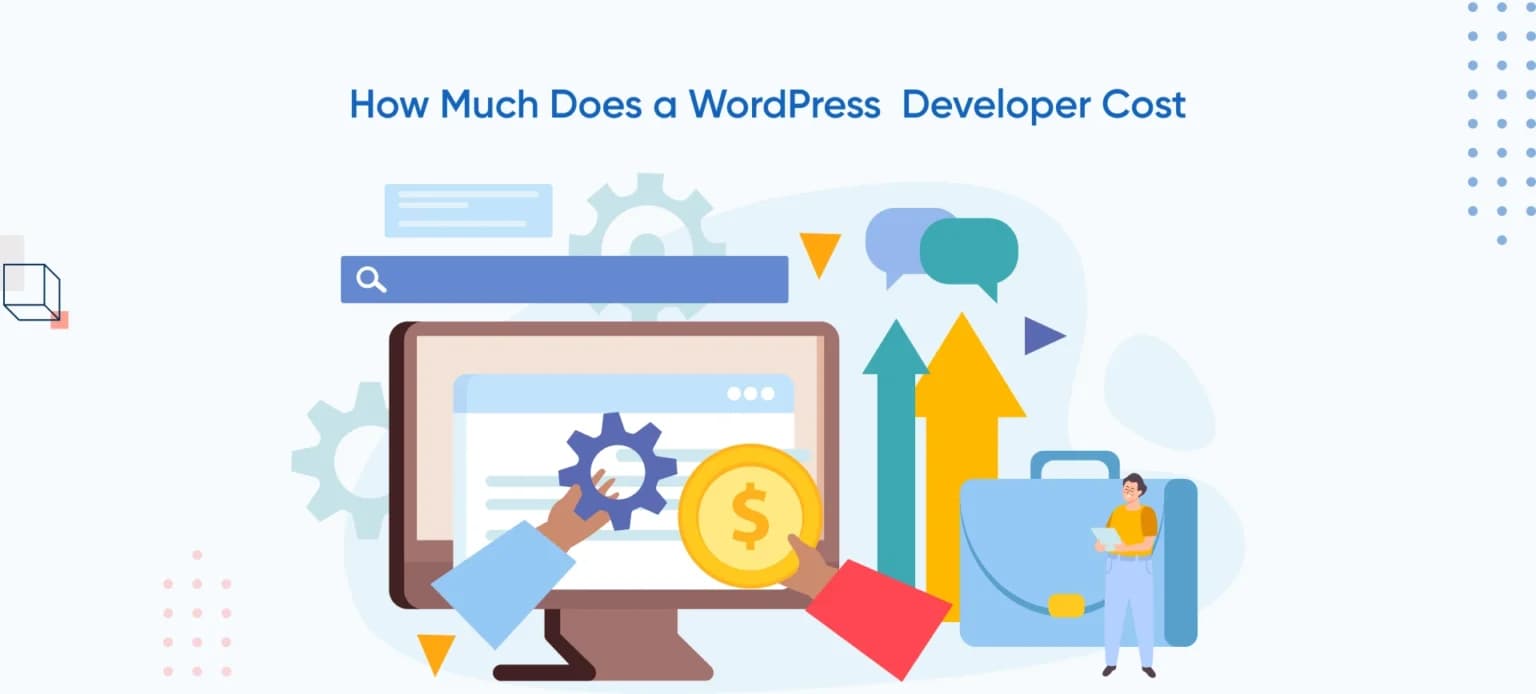Let’s say, you’ve got the basics in place – your idea, your logo, maybe even your first product. Now it’s time for a website that feels modern and reflects your brand.
So you search, “How much does a WordPress site cost?” and the answers range from a few hundred dollars to tens of thousands. Why the huge gap?
Because WordPress can do a lot. A simple brochure site is one thing. A custom platform with logins, payments, and dashboards? That’s another.
The cost depends on what you need – and who you hire to build it.
Recent data indicates that building a WordPress website can cost anywhere from $100 to over $100,000, depending on complexity, features, and the team you hire.
But for WordPress? That could mean anything from a sleek one-pager to a full-scale, revenue-generating machine.
This guide? It’s built to cut through the chaos. We’ll walk you through:
- How WordPress development costs actually work
- What different types of developers charge (and why)
- Whether you should hire a solo dev, an agency, or outsource overseas
No guesswork. No sugarcoating. Just reality on what you’ll pay—and what to expect in return. Let’s break it down. You’re about to make smarter decisions than 90% of businesses out there.
How much does a WordPress developer cost
The cost of hiring a WordPress developer in the U.S. varies widely, typically ranging from $500 to $15,000+ per project, or $30 to $150+ per hour, depending on several key factors:
- Scope of the project: A simple blog or landing page costs less than a custom membership or eCommerce portal.
- Developer experience: Beginners are more affordable but may need more supervision. Senior developers charge more but deliver fast, optimized results.
- Engagement model: Hiring a freelancer can be cheaper upfront. Agencies offer better support and scalability but come with higher price tags.
- Location: Developers in the U.S. charge more than those in India or Southeast Asia for similar quality.
Quick reference:
Project Type | Estimated Cost (USD) |
| Basic 5-page site | $500 – $2,000 |
| Custom small business site | $2,000 – $5,000 |
| eCommerce (WooCommerce) | $5,000 – $10,000 |
| Custom Plugin/API Integration | $8,000 – $15,000+ |
Let’s break down the elements that influence pricing even further.
Factors affecting WordPress developer pricing
Hourly vs Project pricing
Hourly Pricing (U.S. Market):
According to Glassdoor and Indeed, WordPress developers in the U.S. typically charge between $30 and $100 per hour. Rates depend heavily on experience, specialization, and region:
- Entry-level freelancers: $30–$50/hr
- Mid-level developers: $50–$80/hr
- Senior professionals or agency resources: $80–$150+/hr
Hourly pricing works well for tasks like site updates or bug fixes. However, for end-to-end website builds, project-based pricing gives clearer cost visibility.
Project-Based Pricing:
Based on the latest industry research and our years of experience building WordPress sites, project rates typically fall into these brackets:
- Basic 5-page website: $500–$2,000
- Custom business website: $2,000–$5,000
- eCommerce or custom integration project: $5,000–$15,000+
Project pricing is best for businesses with defined goals, as it ensures alignment on budget, scope, and delivery timelines.
Per page pricing
If you know the number of pages your website will have, per-page pricing can help you estimate costs quickly. This model is often used for brochure-style websites, landing pages, or content-heavy builds where the structure is repetitive but volume impacts effort.
Average pricing ranges:
Basic pages (e.g., About, Contact, Services): $50–$150 per page
Mid-level pages (e.g., blog listings, testimonial sections with dynamic content): $150–$300 per page
Advanced pages (e.g., WooCommerce product listings, custom dashboards): $250–$600+ per page
Let’s break that down with an example. A small business site with 8 pages (home, about, services, blog, contact, FAQs, team, testimonials) might cost $1,200–$2,400 using a freelance developer. With an agency, the same scope could range from $2,000–$3,500, depending on design polish and interactivity.
However, not all pages are equal. A custom-designed pricing calculator, advanced form, or user dashboard takes significantly more time than a static text-and-image page. That’s why developers often factor complexity into per-page pricing.
Per-page billing works best for:
- Clear scopes (like company websites, portfolios)
- Repeatable page structures
- Clients who prefer to prioritize sections gradually over time
If your website has 25+ pages with varied features, a project-based model might be more cost-effective. But for targeted builds, per-page pricing provides transparency and helps prevent scope creep.
Experience level
Beginner (0–2 years experience)
Think of beginner developers as your tech-savvy cousin who just started freelancing. They charge around $20 to $40 an hour, and they’re perfect if your needs are simple: a blog, a basic service website, or getting that WordPress theme you bought off ThemeForest finally working. They’ll follow instructions, install plugins, and maybe tweak a few lines of CSS. Just don’t expect them to reinvent the wheel—or debug it if it breaks. Great option if you’re on a budget and okay with a few rough edges (and the occasional, “Hey, I’ll Google that real quick”).
Mid-Level (2–5 years experience)
This is where things get interesting. These folks have seen some stuff. Charging $40 to $80 per hour, mid-level developers are comfortable with custom themes, plugin setups, and optimizing performance. They know their way around Elementor, can handle decent SEO setup, and won’t blink at integrating Mailchimp or Stripe.They’re not going to write you a custom plugin from scratch (unless they’re feeling spicy), but they’re reliable, fast, and efficient. Think of them as the “get-it-done” professionals who won’t ghost you when the deadline hits.
Senior (5+ years experience)
Ah, the unicorns. Senior WordPress developers charge $80 to $150+ per hour, and for good reason. These are the people you bring in when your site is mission-critical, highly customized, or you’re integrating with tools like Salesforce, Zoho, or a NASA satellite (okay, maybe not that last one).
They’ll architect your site for scale, build you a custom plugin in their sleep, and future-proof everything so your next developer doesn’t curse your name. If you’re serious about your digital presence and need things to “just work,” this is where you invest.
Freelance vs Agency
Hiring a freelancer is like calling a handyman. Hiring an agency? That’s like bringing in a full renovation crew with blueprints, deadlines, and a project manager who actually answers your emails.
Freelancers are great when you need quick, one-off work—like a landing page, a blog setup, or minor WordPress fixes. They’re usually more affordable upfront and flexible with scope. But here’s the rub: you’re putting all your eggs in one basket.
If your freelancer gets sick, takes a holiday, or vanishes into the Bermuda Triangle of side projects, you’re stuck waiting (or worse, rebuilding). Communication delays? Possible. Missed deadlines? Not unheard of.
Agencies, on the other hand, bring structure. You’re not just hiring a developer—you’re getting a team. One person focuses on design, another on code, another makes sure it’s all working. You get project efficiency, more manpower, cleaner code, and usually ongoing support baked into the package.
Plus, agencies maintain a managed codebase, meaning if your regular developer wins the lottery and quits tomorrow, someone else can pick up where they left off—no drama. And when it comes to things like QA, deployment, performance optimization, or scaling up with new features down the line, an agency will usually have specialists ready to go.
In short? If your website is business-critical, growing fast, or needs to be delivered on time without you acting as the project manager, the extra cost of an agency often pays for itself – fast.
Geolocation

Let’s be honest: when you’re just starting out – or trying to stretch every dollar- you don’t want your entire marketing budget eaten up by a fancy website build. That’s where location-based hiring decisions come into play.
In the U.S. or Canada, hiring a senior WordPress developer might set you back $100–$150+ per hour. That’s great if you’re building a Fortune 500-level site with complex workflows, but whether you’re an enterprise or a small business just getting your online presence off the ground: here’s the move many smart businesses make – hire globally.
Countries like India, the Philippines, or Thailand offer access to top-tier WordPress talent – often with 5–10 years of experience – for $25–$60 per hour. Same plugins. Same page builders. Same end result. Just without the jaw-dropping invoice.
A marketing agency in Toronto needs a custom WordPress site for a wellness client. Local quotes? $10,000+. Instead, they partner with a vetted dev team in India, pay $4,500, and launch two weeks ahead of schedule – with full support and pixel-perfect execution.
Now, is this about going for the cheapest? Not at all. It’s about finding value. If you do your due diligence (reviews, references, sample work), hiring from the right overseas team can get you agency-level quality without the sticker shock.
Bottom line: location affects price – but not always quality. Play it smart, and your budget can go further than you think.
Miscellaneous cost
So you’ve hired a developer. The site’s looking slick. You’re done, right? Almost. But don’t forget the “invisible” line items that quietly sneak into your overall website budget—often after the developers packed up and moved on.
Website maintenance is the big one. Just like your car, your WordPress site needs regular check-ups – plugin updates, security patches, backups, and bug fixes. Freelancers might charge $50 to $200/month, while agencies usually offer full maintenance retainers ranging from $200 to a few thousands a month depending on your site size.
It sounds like an extra, but it’s peace of mind, and you’ll be glad you paid for it when something breaks at 2 AM on a Sunday.
Then come the “I didn’t know I’d need that” features –
- Custom forms
- Payment gateways
- Booking systems
- Multilingual setup
- Performance optimization
These aren’t always part of the base quote, especially if your scope wasn’t crystal clear upfront.
Depending on complexity, add-on costs can range from $500 to $5,000+.
Pro tip: Before you finalize any deal, ask what’s included, what counts as extra, and whether there’s post-launch support. Because the only thing worse than surprise bugs… is surprise billing.
Hire the best WordPress developer without breaking the bank
At this point, you’ve probably got a good sense of what kind of developer you need and what it might cost. But here’s the good news: you don’t have to trade quality for affordability. At Anglara, we help businesses like yours get high-performing WordPress websites without runaway budgets.
Whether you’re looking to:
- Build a simple site to showcase your services and get leads.
- Launch a feature-rich portal with booking systems, eCommerce, or multilingual support.
- Develop a fully custom WordPress ecosystem with deep third-party integrations (Stripe, Zoho, LearnDash, HubSpot—you name it)… Anglara’s team has done it all.
We’ve helped:
- A local wellness clinic goes live with a clean 7-page site for $2,500, SEO-ready and mobile-optimized.
- A SaaS startup launches a custom dashboard and gated knowledge base for under $10,000.
- A Canadian beauty brand built a multilingual WooCommerce store with full analytics and CRM sync for $12,000.
Here’s the difference: We don’t quote based on fluff. We quote based on what you actually need. You get clear timelines, transparent pricing, and a team that talks to you like a partner – not a helpdesk.
Not sure where to start? That’s exactly what our free consultation call is for. We’ll help you define your scope, clarify what’s essential (and what’s not), and give you a realistic roadmap – with no strings attached.
Book your free call now and let’s build something that works for your budget and your business.




